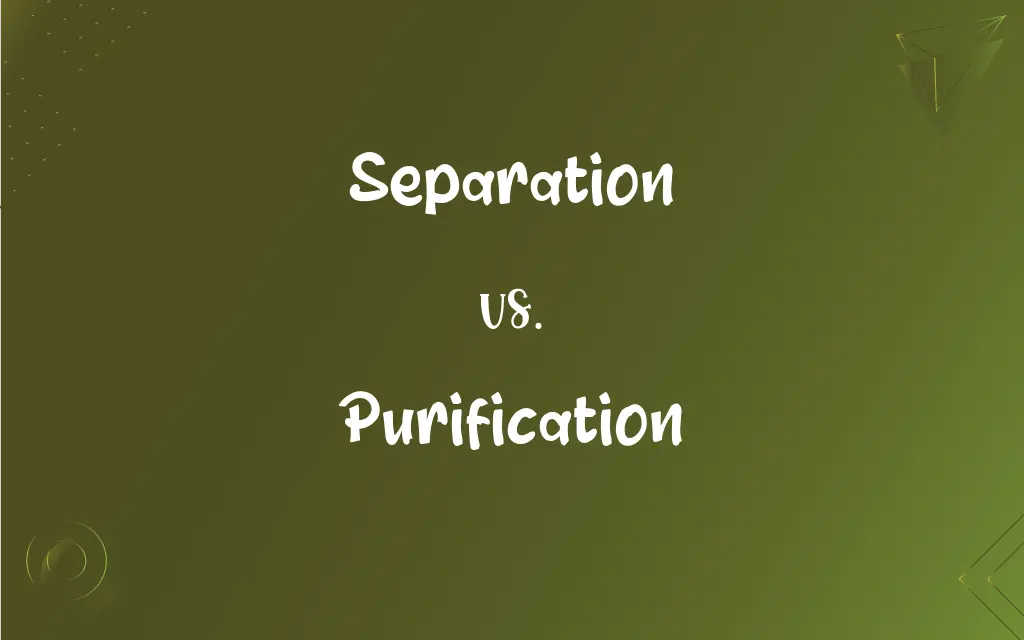Separation vs. Purification: What's the Difference?
Edited by Harlon Moss || By Janet White || Published on December 29, 2023
Separation is the process of distinguishing and dividing different substances or components, while purification is the process of removing impurities or unwanted elements from a substance.

Key Differences
Separation involves dividing a mixture into its individual components without changing their identities. Purification, in contrast, focuses on removing impurities from a substance to improve its quality or purity.
In separation, the goal is to isolate components from a mixture, like separating sand from water. Purification aims to make a substance pure, such as purifying water to make it drinkable.
Separation techniques can be physical, like filtration or sedimentation, and don't necessarily remove all impurities. Purification often involves chemical processes, ensuring the substance is free from contamination.
Separation is often the first step in a process, used to sort different elements. Purification is a refining step, enhancing the quality or usability of the primary substance.
In separation, no chemical change occurs in the substances being separated. In purification, the process may alter the chemical structure to remove unwanted elements.
ADVERTISEMENT
Comparison Chart
Goal
To divide components of a mixture.
To remove impurities and refine a substance.
Techniques
Often physical (e.g., filtration, decanting).
Often chemical (e.g., distillation, adsorption).
Purpose in Process
To isolate components for further use.
To enhance quality or purity for final use.
Nature of Change
Primarily physical changes.
Can involve chemical changes.
Application Example
Separating salt from seawater.
Purifying water for drinking.
ADVERTISEMENT
Separation and Purification Definitions
Separation
Separation involves sorting different items or substances.
The separation of recyclables simplifies waste management.
Purification
Purification is the process of making something pure by removing contaminants.
The purification of wastewater is essential for environmental safety.
Separation
Separation refers to the isolation of elements from a group.
The separation of different metals from electronic waste is challenging.
Purification
Purification is the act of making something free from pollutants.
The new filter system greatly improved water purification.
Separation
Separation means partitioning or segregating items.
The separation of grains based on size is crucial in agriculture.
Purification
Purification means refining a substance to remove impurities.
The purification of air in hospitals is vital for patient health.
Separation
Separation is dividing a mixture into distinct components.
The separation of oil and water was necessary before processing.
Purification
Purification involves cleansing or clarifying substances.
The purification process in the brewery ensures the quality of beer.
Separation
Separation is the process of setting apart or dividing.
The lab technician completed the separation of the chemical compounds.
Purification
Purification refers to the treatment of materials to enhance purity.
Gold purification is a critical step in jewelry making.
Separation
The act or process of moving apart or forcing something apart
The separation of continents from a single landmass.
The separation of railroad cars from a train.
Purification
The act or an instance of cleansing or purifying.
FAQs
Why is separation important in chemistry?
It allows chemists to isolate specific substances from mixtures for further analysis or use.
Is separation important in environmental science?
Absolutely, for tasks like separating pollutants from water and air.
What is separation in scientific terms?
Separation refers to the process of dividing a mixture into its individual components.
Can separation be used in recycling?
Yes, it's crucial in recycling to separate different materials for proper processing.
Is separation a physical or chemical process?
Most separation techniques are physical processes that don't change the chemical nature of components.
What are common methods of separation?
Common methods include filtration, distillation, centrifugation, and chromatography.
What is purification?
Purification is the process of removing impurities or unwanted elements from a substance.
How is purification different from separation?
While separation divides a mixture into parts, purification specifically aims to remove impurities from a single substance.
What are common purification methods?
Methods include distillation, filtration, crystallization, and adsorption.
What is an example of a simple separation process?
Filtration of a mixture of sand and water is a simple example.
What is an example of purification in everyday life?
Boiling water to remove impurities is a common example.
How does gravity impact separation techniques?
Gravity is used in methods like sedimentation and decantation to separate substances based on density.
Can separation processes be reversed?
Yes, many separation processes are reversible, like mixing separated sand and salt back together.
Why is water purification essential?
To make water safe for drinking by removing contaminants and pathogens.
Can purification be used in air treatment?
Yes, air purifiers remove contaminants like dust, pollen, and smoke from the air.
What role does separation play in the food industry?
It's used for processes like refining oils, clarifying juices, and purifying dairy products.
How does purification contribute to sustainability?
It allows for the reuse of resources, like purifying wastewater for irrigation.
Can purification change the chemical nature of a substance?
Typically, purification aims to retain the chemical nature of the substance while removing contaminants.
Is purification important in pharmaceuticals?
Crucially so, for ensuring medications are free from harmful impurities.
What role does purification play in laboratory research?
It's essential for ensuring that chemicals and reagents are pure for accurate experimental results.
About Author
Written by
Janet WhiteJanet White has been an esteemed writer and blogger for Difference Wiki. Holding a Master's degree in Science and Medical Journalism from the prestigious Boston University, she has consistently demonstrated her expertise and passion for her field. When she's not immersed in her work, Janet relishes her time exercising, delving into a good book, and cherishing moments with friends and family.
Edited by
Harlon MossHarlon is a seasoned quality moderator and accomplished content writer for Difference Wiki. An alumnus of the prestigious University of California, he earned his degree in Computer Science. Leveraging his academic background, Harlon brings a meticulous and informed perspective to his work, ensuring content accuracy and excellence.






































































